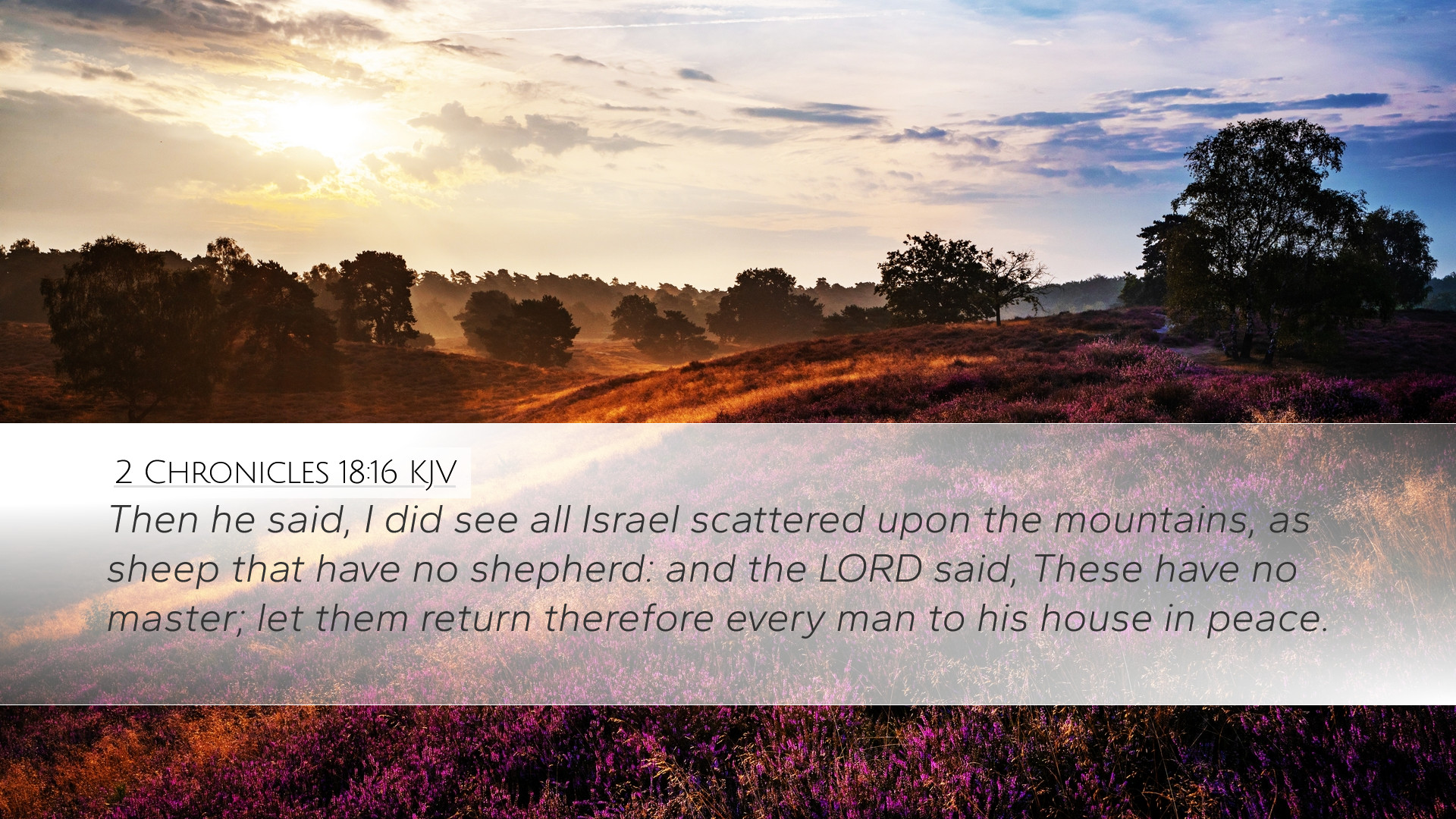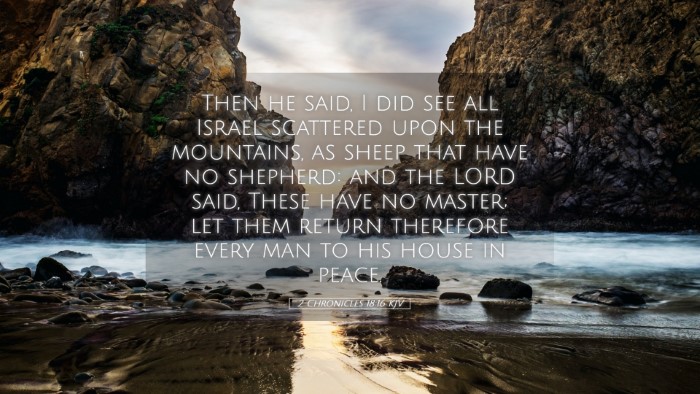Verse: 2 Chronicles 18:16
“And he said, I did see all Israel scattered upon the hills, as sheep that have no shepherd: and the LORD said, These have no master; let them return therefore every man to his house in peace.”
Contextual Analysis
This verse appears in the narrative of King Jehoshaphat's alliance with King Ahab and provides a crucial insight into the prophetic discourse preceding the battle at Ramoth-Gilead. As Jehoshaphat seeks guidance on the military campaign, the prophetic declaration encapsulated in this verse illustrates the dire spiritual condition of Israel and God's foreknowledge of the impending conflict.
The Nature of the Prophecy
According to Matthew Henry, the vision witnessed by Micaiah reveals a metaphor of Israel’s state, likening them to "sheep without a shepherd." This imagery emphasizes the absence of Godly leadership and guidance. The Lord’s response indicates that the people, once united under a covenant with Him, are now fractured due to Ahab's rebellious influence. The prophetic vision serves as both a warning and a revealing of God’s judgment on Israel’s spiritual negligence and the consequences to follow.
Implications of Leadership
Adam Clarke notes that the term "shepherd" in biblical literature often denotes a leader who guides and protects. Here, the lack of shepherding implies that the leaders of Israel have failed in their responsibilities, leading them into chaos and vulnerability. The mention that "the LORD said, These have no master" underscores the accountability of the leaders and the resultant scattered state of the people. The verse serves as a poignant reminder of the significant role leadership plays in guiding the people towards God’s will and purposes.
The Lord's Compassion
The compassionate nature of God is also highlighted. Albert Barnes expounds on the idea that God’s declaration of "let them return therefore every man to his house in peace" showcases His desire for His people’s welfare even amidst judgment. While discipline is necessary for transgression, God still offers solace, allowing His people the opportunity to return to a place of peace, emphasizing God’s continuing love despite their rebellion.
Theological Reflections
This verse raises critical theological reflections regarding the perception of divine sovereignty, human agency, and leadership in the spiritual landscape. The juxtaposition of God's impending judgment with His desire for peace signifies the complex interplay of divine justice and mercy.
Divine Sovereignty and Human Agency
The sovereignty of God is depicted through His ability to foresee the outcome of Israel's condition. The prophetic word suggests that human decisions — like Ahab’s defiance — lead to significant consequences. The chaos experienced by Israel due to a lack of shepherding and misguided leadership underscores the reality of free will and its impact on communal well-being. According to Matthew Henry, this serves as a reminder for contemporary leaders to seek divine guidance to prevent similar spiritual disarray.
Pastoral Insights
For pastors, this verse is an admonition regarding their vital roles as shepherds of their congregations. Just as Micaiah delivered a difficult truth to Ahab and Jehoshaphat, modern-day leaders must be courageously truthful with their congregants, ensuring that the teachings reflect the heart of God. There exists a dual responsibility — to protect the flock from spiritual dangers and to guide them back to peace with God.
Applications for Scholars and Theologians
Scholars and theologians are invited to consider the broader meta-narrative of Scripture when reflecting on this verse. The theme of God providing for His people, regardless of their failings, invites deep theological inquiry into the character of God and His actions throughout biblical history.
Comprehensive Exegesis
Exegesis of this verse not only entails understanding its immediate context but also exploring its implications within the entirety of Israel’s history. Clarke suggests that examining the reactions of Israel's subsequent leaders could further illuminate the essence of godly leadership and its impact on a community's fate.
Reflection on the Nature of Peace
Finally, this passage can provoke a deeper reflection on the nature of peace in the Bible. God’s desire for peace amidst chaos reinforces the theological understanding that true peace is found only in submission to God's will. This challenges modern interpretations that often equate peace with the absence of conflict, directing theologians to a more biblically rooted perspective that embraces peace as a relational and covenantal concept.


